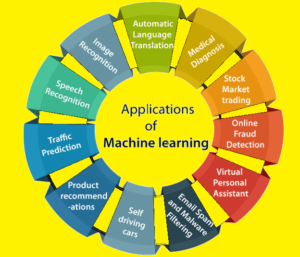
Applications of Machine Learning
Five Real-World Applications of Machine Learning:
The world of technology is constantly evolving, and one of the latest advancements that have taken industries by storm is machine learning. This revolutionary technology has the ability to analyze vast amounts of data and learn from it, making it a powerful tool for businesses looking to gain insights and improve their operations. From healthcare to finance, machine learning is being applied in various industries to automate processes, increase efficiency, and enhance decision-making. This article will explore five real-world applications of machine learning and how they are revolutionizing how businesses operate. Whether you’re a business owner or simply curious about the latest technological advancements, this article will provide valuable insights into the exciting world of machine learning and its potential to transform industries. So, let’s dive in and discover how machine learning is changing the game.
The Impact of Machine Learning on Industries:
Machine learning is changing the way businesses operate, and its impact is being felt across a wide range of industries. By automating processes and providing valuable insights, machine learning is helping companies to become more efficient and effective. According to a report by McKinsey, machine learning has the potential to create $3.5 trillion to $5.8 trillion in value annually across nine business functions in 19 industries. This shows the immense potential of machine learning to transform industries and create significant value for businesses.
One of the critical advantages of machine learning is its ability to analyze vast amounts of data quickly and accurately. This allows businesses to gain previously impossible insights, leading to better decision-making and improved outcomes. For example, in the healthcare industry, machine learning is being used to analyze patient data and develop personalized treatment plans based on individual needs. Similarly, in the finance industry, machine learning is being used to analyze financial data and identify investment opportunities.
Another advantage of machine learning is its ability to automate processes, reducing the need for manual intervention and increasing efficiency. This is particularly important in industries such as e-commerce and transportation, where speed and accuracy are critical to success. Businesses can reduce costs and improve customer satisfaction by automating processes such as order fulfilment and logistics management.
In the following sections, we will explore five real-world applications of machine learning and how they revolutionize businesses’ operations.
Machine Learning in Healthcare:
Machine learning is being applied in the healthcare industry to revolutionize delivering healthcare. By analyzing patient data, machine learning algorithms can develop personalized treatment plans considering individual needs, preferences, and medical history. This has the potential to improve patient outcomes and reduce healthcare costs.
One example of machine learning in healthcare is the development of predictive models to identify patients at risk of developing chronic diseases such as diabetes and heart disease. By analyzing patient data such as age, BMI, and medical history, machine learning algorithms can identify patients who are at high risk of developing these conditions. This allows healthcare providers to intervene early, providing preventative care and reducing the patient’s likelihood of developing these conditions.
Another example of machine learning in healthcare is the development of personalized treatment plans for cancer patients. By analyzing patient data such as tumour size and genetic markers, machine learning algorithms can identify the most effective treatment plan for each individual patient. This has the potential to improve patient outcomes and reduce the side effects of treatment.
Machine Learning in Finance:
Machine learning is being applied in the finance industry to analyze financial data and identify investment opportunities. By analysing historical data and market trends, machine learning algorithms can identify patterns and predict future market movements. This allows investors to make more informed investment decisions and reduce the risk of losses.
One example of machine learning in finance is the development of robo-advisors. These automated investment platforms use machine learning algorithms to analyze financial data and provide investment advice to clients. By providing personalized investment advice based on individual needs and risk tolerance, robo-advisors are helping to democratize investment and make it more accessible to a broader range of people.
Another example of machine learning in finance is the development of fraud detection systems. By analyzing financial data and transaction histories, machine learning algorithms can identify patterns of fraudulent activity and alert financial institutions to potential fraud. This could reduce economic losses and improve the security of financial transactions.
Machine Learning in E-commerce:
Machine learning is being applied in the e-commerce industry to personalize customers’ shopping experiences and improve order fulfilment efficiency. By analyzing customer data such as browsing history and purchase history, machine learning algorithms can provide personalized recommendations tailored to each customer.
One example of machine learning in e-commerce is the development of personalized product recommendations. By analyzing customer data such as purchase history and browsing behaviour, machine learning algorithms can recommend products that are likely to interest each customer. This has the potential to increase sales and improve customer satisfaction.
Another example of machine learning in e-commerce is the development of automated order fulfilment systems. By using machine learning algorithms to optimize order fulfilment processes, e-commerce businesses can reduce the time it takes to fulfil orders and improve order fulfilment accuracy. This has the potential to reduce costs and improve customer satisfaction.
Machine Learning in Transportation:
Machine learning is being applied in the transportation industry to improve logistics management efficiency and reduce transportation costs. By analyzing data such as traffic patterns and weather conditions, machine learning algorithms can optimize logistics routes and reduce the time it takes to transport goods.
One example of machine learning in transportation is the development of predictive maintenance systems for vehicles. By analyzing data such as vehicle usage and maintenance history, machine learning algorithms can predict when maintenance is required and schedule it in advance. This has the potential to reduce downtime and improve the efficiency of transportation operations.
Another example of machine learning in transportation is the development of automated logistics management systems. By using machine learning algorithms to optimize logistics routes and manage inventory levels, transportation businesses can reduce transportation costs and improve logistics operations’ efficiency.
Machine Learning in Marketing:
Machine learning (ML) is being applied in the marketing industry to personalize marketing campaigns and improve the effectiveness of advertising. ML algorithms can provide personalized recommendations and target advertising to specific customer segments by analyzing customer data such as browsing behaviors’ and purchase history.
One example of machine learning in marketing is the development of personalized email marketing campaigns. By analyzing customer data such as purchase history and browsing behaviour, machine learning algorithms can provide personalized recommendations and promotions tailored to each customer. This has the potential to increase sales and improve customer loyalty.
Another example of machine learning in marketing is the development of targeted advertising campaigns. By analyzing customer data and market trends, machine learning algorithms can identify specific customer segments and target advertising to those segments. This has the potential to improve the effectiveness of advertising and reduce advertising costs.
Real-World Examples of Machine Learning Applications:
In addition to the examples discussed above, there are many other real-world machine-learning applications. For example, the manufacturing industry utilizes machine learning to optimize production processes and improve quality control. Similarly, the energy industry applies machine learning to optimize power generation and reduce energy consumption.
Another example of machine learning is its use in natural language processing. By analyzing large amounts of text data, machine learning algorithms can identify patterns and develop natural language processing models for chatbots and other automated customer service systems.
Benefits of Machine Learning for Businesses:
The benefits of machine learning for businesses are clear. By automating processes, providing valuable insights, and improving decision-making, machine learning can help businesses to become more efficient, effective, and profitable. In addition, machine learning can help businesses to stay competitive in a rapidly evolving technological landscape.
Implementing machine learning in business operations also presents challenges. These challenges include the need for specialized expertise, the cost of implementing machine learning systems, and data privacy and security concerns.
Future of Machine Learning:
The future of machine learning is bright, and its potential to transform industries is immense. As machine learning algorithms become more advanced and data becomes more readily available, machine learning applications will continue to expand. In the future, new and innovative applications of machine learning will emerge, including the development of autonomous vehicles and the optimization of supply chain management.
Conclusion:
Machine learning is revolutionizing industries and changing the way businesses operate. Various industries apply machine learning in healthcare, finance, e-commerce, transportation, marketing, and manufacturing to automate processes, increase efficiency, and enhance decision-making. The benefits of machine learning for businesses are clear, and its potential to transform industries is immense. As machine learning continues to evolve, we expect to see new and innovative applications that will further revolutionize how we live and work.

Pingback: AI and Blockchain